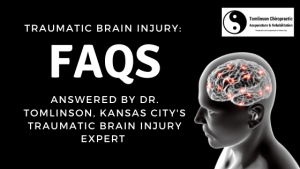
What is a Traumatic Brain Injury?
A traumatic brain injury, or TBI, occurs after damage is caused to the brain. This damage is generally caused after the head is rapidly moved or “jolted.” This movement causes the brain to move within the skull and damage to the tissue occurs. A traumatic brain injury can also occur if something penetrates the skull and brain tissue.
What Are the Symptoms of Traumatic Brain Injuries?
Symptoms can vary widely depending on the type and severity of the injury. These symptoms may also occur immediately following injury, and last from days to even months after a TBI. According to the NIH, are some common symptoms of those who experience a Traumatic Brain Injury:
-Loss of consciousness
-Headache
-Confusion
-Dizziness
-Lightheadedness
-Blurry vision
-Rining in the ears
-Fatigue
-Change in sleeping patterns
-Memory loss
-Trouble thinking or concentrating
-Nausea or vomiting
-Seizures or convulsions
-Inability to awake after sleeping
-Dilation of pupils
-Slurred speech
-Bad taste in the mouth
-A weakness of arms or legs
-Coordination issues
-Restlessness or agitation
How Is Traumatic Brain Injury Treated?
At Tomlinson Chiropractic, we have many forms of treatment for Traumatic Brain Injuries. These treatments include:
-Acupuncture- using tiny needles to stimulate pressure points on the body to reduce symptoms of traumatic brain injury such as pain, headaches, and nausea. This also allows the nervous system to be stimulated and begin healing the body.
-Auriculotherapy- uses acupuncture on the ear.
-Vestibular Rehabilitation Therapy- uses rehabilitation techniques to reduce symptoms of TBI, and to maintain balance and coordination.
-Spinal Subluxation- this includes chiropractic adjustments that help realign the spinal cord, which allows the nervous system to properly function and treat symptoms caused by TBI.
-Qigong- this form of ancient Chinese medicine is a form of exercise combined with breathing techniques that will improve balance and the immune system, increases blood flow, reduces pain, and stimulates the nervous system.
-Neurofeedback- this noninvasive technique monitors your brain function and highlights any abnormalities. This allows us to treat the cause of the symptoms following a brain injury.
-Brain tapping- this non-invasive treatment helps to increase blood flow within the brain and is used to reduce pain, open blocked pathways, and allow the nervous system to operate at its optimal potential.
-Brain Laser Therapy- this non-invasive, painless treatment uses a low-level laser to emit light into the brain. This helps to stimulate cells within the brain, allowing for new cells to be created and repair the damaged cells within the brain.
What are Common Causes of Traumatic Brain Injuries?
Causes of brain injury can vary, but some common causes of TBIs are:
-Car accidents- this is the 2nd most common cause for TBIs.
-Falls- this is the most common cause of TBIs.
-Sports Injuries
-Non-accidental injuries such as child abuse, blunt-force trauma to the head, and domestic abuse.
What is the Outlook of Someone Who Has Endured a Traumatic Brain Injury?
Again, this varies greatly depending on the cause and severity of the injury, as well as any underlying conditions of the person. Obviously, most brain injuries are mild and have good outlooks for recovery. More severe cases are less common but can occur. According to the NIH, the most common results of a TBI include:
-Memory loss
-Trouble thinking
-Impaired reasoning
-Sensory processing disorders
-Depression
-Anxiety
-Aggression
Additional, less common prognosis of TBIs include:
-Comas
-Unresponsiveness
-Vegetative state
-Death
Dr. Tomlinson is an expert in treating mild traumatic brain injury, post-concussion syndrome, and more. To begin your journey to recovery, give us a call, and schedule your appointment today. 816-584-0444.
References:
https://www.ninds.nih.gov/Disorders/All-Disorders/Traumatic-Brain-Injury-Information-Page
